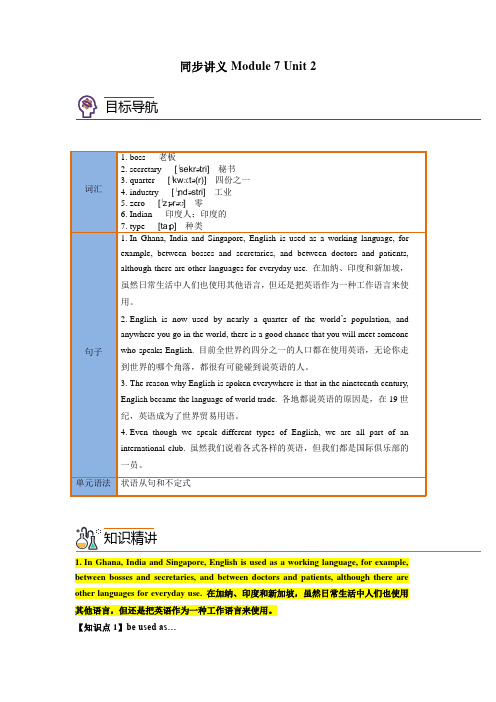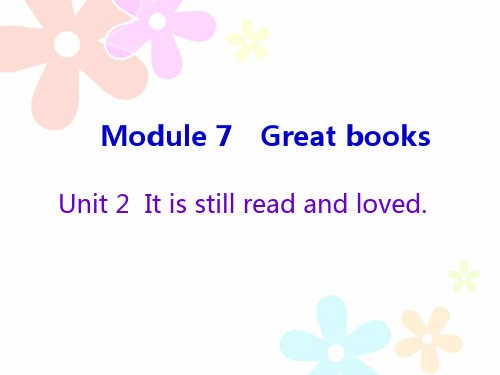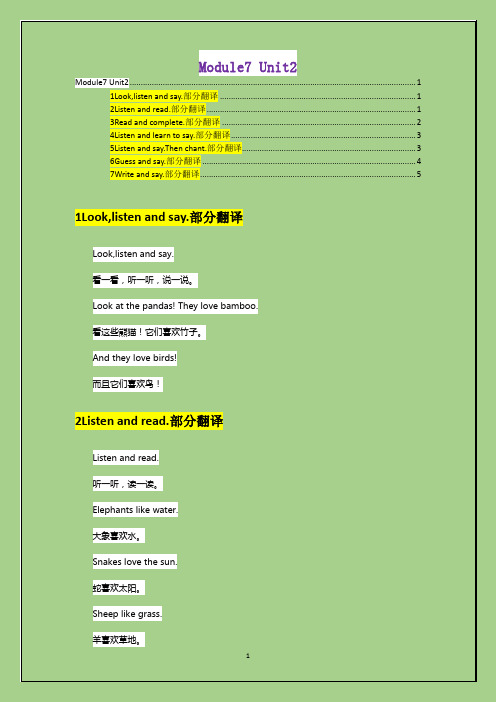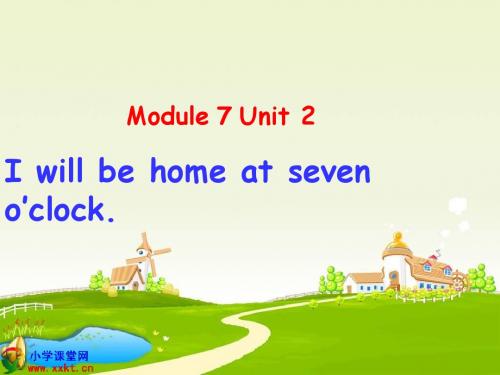Module 7 Unit 2
- 格式:doc
- 大小:124.50 KB
- 文档页数:27

同步讲义 Module 7 Unit 2词汇1. boss 老板2. secretary [ˈsekr ətri] 秘书3. quarter [ˈkw ɔ:t ə(r)] 四份之一4. industry [ˈɪnd əstri] 工业5. zero [ˈz ɪər əʊ] 零6. Indian 印度人;印度的7. type [ta ɪp] 种类句子1. In Ghana, India and Singapore, English is used as a working language, for example, between bosses and secretaries, and between doctors and patients, although there are other languages for everyday use. 在加纳、印度和新加坡,虽然日常生活中人们也使用其他语言,但还是把英语作为一种工作语言来使用。
2. English is now used by nearly a quarter of the world ’s population, and anywhere you go in the world, there is a good chance that you will meet someonewho speaks English. 目前全世界约四分之一的人口都在使用英语,无论你走到世界的哪个角落,都很有可能碰到说英语的人。
3. The reason why English is spoken everywhere is that in the nineteenth century, English became the language of world trade. 各地都说英语的原因是,在19世纪,英语成为了世界贸易用语。
4. Even though we speak different types of English, we are all part of an international club. 虽然我们说着各式各样的英语,但我们都是国际俱乐部的一员。




Module 7 Great booksUnit 2 It is still read and loved. & Unit 3Step 1 RevisionStep 2 Language points1. escape/I'skeIp/ v. 逃离;逃脱【考点】1. escape vi. 逃走,逃脱,脱离。
通常与 from 连用。
eg : The thief has escaped. 贼已经逃走了。
2. escape vt. 避开、躲避不愉快的事 (如危险、处罚、不幸、灾难等) 。
eg : He tried to escape punishment. 他设法躲避惩罚。
3. escape 后跟动词时,应跟其动 名词形式。
eg : There is no way to escape doing the work. 没有办法逃脱做这项工作。
【拓展】常见必须跟动名词作宾语的动词及短语:enjoy , finish , mind , practise , risk , allow , avoid , imagine , suggest , feel like , can't help(情 1.冒险(经历)________ 2.逃离;逃脱 ________3.死的;去世的 ________ →去世(动词)________ →去世(名词)________4.邻居 ________5. 惊奇的; 惊讶的 ________ → 对…… 感到惊奇( 动词)________ → 惊奇( 名 词)________6.活着的 ________7.南方的 ________ → 南方(名词) ________8.举止;行为;情节________ →表演(动词)________ →演员(名词) ________9.日常的;普通的 ________ 10.对话 ________ 1. get into trouble____________ 2. all over the world____________ 3. run away____________ 4. for a time____________5. 为……付出代价____________ 6.充满 ____________7.作为回报 ____________ 8.起初 ____________1.still, today, read, by, their, are, people, works, many( 今天,许多人仍然阅读他们的作品。


Module 7 Unit 2 短语句型背诵1. open sth up: 1)打开某建筑物或其大门=open sthopens up the school/ the gate of the school打开学校(大门)。
2)开放某事物(使之受到更少的限制从而让更多人或组织可以接近或使用) open up higher education. 放开高等教育(即让更多的人可以接受高等教育)。
3)开拓/ 开辟某事物open up new markets 开拓新市场2. focus on (doing) sth / sb 集中精力做…,集中关注,主要做…,重点放在…3. it be likely that sb / sth…= sb / sth be likely +不定式:很可能某人/某物…,某人/某物很可能…It’s very likely that aspirin will be found in the cupboard. = Aspirin is very likely to be found in…阿司匹林很有可能会在柜子里发现。
It’s likely that the disaste r was caused by a careless mistake. = The disaster is likely to have been caused by a careless mistake. 这个灾难很可能就是当时一个粗心的失误造成的。
4. prove: 1) 及物动词:prove sth, prove that…证明某事情;prove sb / sth + n. / adj. / 不定式作宾补The findings proved his guess. 当时那些发现证明了他的猜测(是对的)。
What happened later proved that the medicine hadn’t worked on you. 后来发生的事情证明了那个药之前对你根本没效果。

三年级上册英语-Module 7 Unit 2What’s that外研版(三起)知识点概述Module 7 Unit 2是外研版三年级上册英语教材的第七单元第二课时,主要介绍了关于物体名称的英语词汇。
本单元教学目标:1.能够听懂、朗读、理解物体名称等基本词汇。
2.能够进行简单的物品的描述和询问。
3.能够学会用英文表达一些简单的询问。
4.培养学生英语听、说、读、写四种基本语言技能。
教学内容1. 教材原文What’s that?It’s a pencil.What’s that?It’s a book.What’s that?It’s a ruler.What’s that?It’s a pen.2. 词汇表•pencil 铅笔•book 书•ruler 尺子•pen 钢笔教学过程1. Class opening老师可以带着学生通过不同的图片和道具进行识物和学习新单词,并从学生中挑选一些同学来描述这些物品。
2. 阅读原文老师可以大声读出原文,学生跟着朗读,并在课堂上进行简单的问答练习。
3. 学生练习老师可以让学生进行语音练习,朗读的时候注重发音,语感,注意单句语调的上升下降,练习语音的连贯性和自然度,以更好地理解和记忆单词的发音以及语音练习。
4. 角色扮演老师可以安排学生们分成小组,进行简单的英语角色扮演,在角色扮演中学生可以通过马上语言打破自己的抑制,勇于开口,勤于思考,让学生理解和掌握物品的名称。
总结本单元主要学习了一些日常使用物品的英文名称,多练习和加强的是听,说和读的技能。
同学们在课堂上通过老师和同学的帮助,不断强化对英语语音和文化的接受和理解,渐渐地感受到学习英语的乐趣。

Module7 Unit2Module7 Unit2 (1)1Look,listen and say.部分翻译 (1)2Listen and read.部分翻译 (1)3Read and complete.部分翻译 (2)4Listen and learn to say.部分翻译 (3)5Listen and say.Then chant.部分翻译 (3)6Guess and say.部分翻译 (4)7Write and say.部分翻译 (5)1Look,listen and say.部分翻译Look,listen and say.看一看,听一听,说一说。
Look at the pandas! They love bamboo.看这些熊猫!它们喜欢竹子。
And they love birds!而且它们喜欢鸟!2Listen and read.部分翻译Listen and read.听一听,读一读。
Elephants like water.大象喜欢水。
Snakes love the sun.蛇喜欢太阳。
Sheep like grass.羊喜欢草地。
Bears like to sleep in winter.熊喜欢在冬天睡觉。
Dogs like playing with children.狗喜欢和孩子们玩耍。
Pandas love bamboo.熊猫喜欢竹子。
3Read and complete.部分翻译Read and complete.读一读并完成。
believe相信eat吃love喜欢Look at看sleep睡觉1 Bears like to_____in winter,but dogs don't.1熊喜欢在冬天_____,但是狗不喜欢。
2 Monkeys like to_____bananas and pandas _____bamboo.2 猴子喜欢____香蕉,熊猫_____竹子。


Module 7 Unit 2 A child sleeps for ten hours a night(教学设计)一、教学目标1.能听懂并理解课文提供的信息;2.能根据课文内容完成相关练习;3.能用英语描述一个孩子的睡眠习惯;4.能自觉遵守作息规律,培养正确的睡眠习惯。
二、教学重点1.学会运用正确的词汇描述睡眠习惯;2.能通过听、说、读、写的方式理解和掌握课文内容。
三、教学难点1.发音准确,语调顺畅;2.通过听力训练,理解文章整体意思,不理解的单词通过上下文推断词义。
四、教学准备录音机、图片展示、课件、单词卡片、练习册。
五、教学内容及过程Step1 Revision1.让学生回顾上节课学到的单词,如:day, night, afternoon, wear, wash, bath, breakfast, lunch, dinner等;2.让学生朗读课文中的例句:“A child sleeps for ten hours a night. She needs a good sleep to be healthy and happy.”Step2 Presentation1.展示一张图片,让学生观察图片并描述图片中人物的睡眠状态;2.引导学生说出相关单词,如:睡眠,睡衣,床,枕头,被子,毯子等;3.呈现幻灯片,让学生了解一些睡眠知识,如:良好的睡眠习惯对人体健康的重要性。
Step3 Listening1.耳朵舞动时间。
播放录音,让学生跟读线索;2.再次播放录音,让学生听懂其中内容;3.询问学生这个孩子有多少小时睡眠时间,为什么需要好的睡眠等问题。
Step4 Reading1.展示字词、图片、句子搭配的课件,读单词并让学生跟读;2.让学生朗读课文,并帮助他们理解课文中较复杂的词汇和句子;3.在学生已经理解课文的情况下,进行小组阅读并完成相关阅读题。
Step5 Writing1.让学生分成小组,互相描述自己的睡眠习惯;2.让学生用自己的语言,写一篇简短的文章描述一个健康的睡眠的必要性;3.收集文章,并挑选一篇作为优秀作品展示。

外研版九年级下册英语Module7Unit2部分课文翻译外研版九年级下册英语Module7 Unit2部分课文翻译(一) where they are它们所在的地方what languages you can see你能看到的语言1.How many people in the world use English?世界上有多少人使用英语?2.How did English bee an international language?英语是如何成为一门国际语言的?3.When do you think Chinese will bee an international language?你认为什么时候汉语会成为一门国际语言?4.Who owns English?谁拥有英语?Who owns English?谁拥有英语?English is spoken by about 400 million people,mostlyin the US, the UK, Canada, Australia, New Zealand and South Africa. In Ghana,India and Singapore , Englishis used as a working language, for example, between bosses and secretaries and between doctors and patients,although there are other languages for everyday use.In China and many other countries,English is the. most important toreign language that children learn at school, because when they grow up, it will be quite possible for them to meet people from other countries. They will need a mon language to municate with each other. English is now used by nearly a quarter of the world's population,and anywhere you go in the world,there is a good chance that you will meet someone who speaks English.大约有4亿人说英语,主要在美国、英国、加拿大、澳大利亚、新西兰和南非。


四年级下册英语教案 - Module7 Unit 2 Grandma cooked fish∣外研版(三起)教材分析•教材:四年级英语外研版(三起)下册•模块:Module7 Unit 2•主题:Grandma cooked fish本单元主要围绕着“Grandma cooked fish”这一话题展开,学习内容包括:熟悉新单词及短语,学会用过去式描述过去的事情,练习使用“excuse me”等礼貌用语,培养小学生们发现生活中的美好和感恩的情感体验。
教材中的文章情境性强,情感与情感交流占据更为重要的地位;知识面宽,除了英语外,更有很多的国家地理和动物知识。
教学目标1.熟悉单词及短语:excuse me, cooked, market, bought, vegetable, tomato;2.学会用过去式描述过去的事情;3.练习使用“excuse me”等礼貌用语;4.通过阅读文章,培养小学生们发现生活中的美好和感恩的情感体验;5.培养小学生的口语表达能力。
教学重点与难点教学重点1.“excuse me”等礼貌用语的使用;2.讲述人物发生的过去的事情。
教学难点学生如何用过去式描述过去的事情,因为大多数学生习惯于只能说一般现在时。
教学过程教学准备1.教案课件;2.唐老师的卡片、照片。
3.视频设备。
教学步骤Step 1 打招呼和分享’Beautiful thing’1.Greet the students in English and ask them to greet each other.2.Ask students to share a。


四年级上册英语说课稿- Module 7 Unit 2 There are twelve boys on the bike 外研社(三起)一、教学目标1.能听懂、会说、会读、会写句型 There are twelve boys on the bike.2.能运用数词和名词教学重点词汇 twelve, boys, bike.3.培养学生的听、说、读、写能力。
4.培养学生的团队意识。
二、教学重点1.熟练掌握句型 There are twelve boys on the bike.2.掌握数词 twelve 和名词 boys, bike 的读音和拼写。
三、教学难点1.在听、说、读、写中准确运用句型 There are twelve boys on the bike.2.巩固数词 twelve 和名词 boys, bike 的读音和拼写。
四、教学过程1. 导入1.请学生观看图片展示,导入本课新单词 boys, bike.2.请学生描述图片,呈现本课话题和学习目标。
2. 呈现1.通过图片展示引导学生学习句型 There are twelve boys on the bike.2.教师教授重点词汇 twelve, boys, bike 的读音和拼写。
3. 练习1.请学生口头描述图片,运用句型 There are twelve boys on the bike.2.针对学生的练习口语和听力理解,老师播放听力并让学生回答问题。
3.引导学生描述与数字和物品相关的图片。
4. 温故知新1.复习数字 1-20 和单词 bike, boys. 通过游戏,快速复习重点词汇。
2.询问学生该图片上有多少个人、多少辆自行车,并引导学生运用句式:There are …5. 创造1.将学生分为若干个小组,每组分别制作有所不同的图片展示,展示的场合分别为课堂、图书馆、操场等。
2.每个小组需要用句型 There are twelve boys on the bike 来描述图片,并将图片展示给全班。


四年级上册英语教案-Module 7 Unit 2 There are twelve boyson the bike 外研版(三起)教材分析本教材为四年级上册英语教材的第七个模块,第二个单元所使用的教材为外研版(三起)。
本单元主要通过介绍人物、自行车和数字来帮助学生掌握英语数字的用法以及基本的英语句式。
教学内容本节课教学的内容主要包括以下几个方面:1.复习数字1-10的表达方式。
2.练习使用数字0-12进行计数。
3.学习新单词bike(自行车)、boys(男孩)。
4.学习句式“There are twelve boys on the bike.”(自行车上有十二个男孩。
)。
5.练习句子的口语表达和书写。
教学目标1.学生能够听、说、读、写数字0-12.2.学生能够听懂和说出新单词bike和boys。
3.学生能够理解并使用句式“There are twelve boys on the bike.”。
4.学生能够通过听力、口语和书写练习来掌握数字、单词和句型的使用。
教学重点1.学生能够正确使用数字0-12进行计数。
2.学生能够使用新单词bike和boys。
3.学生能够正确使用句式“There are twelve boys on the bike.”。
教学步骤1.热身:用10以内的数字互相询问年龄,比如问“Are you 6 years old?” ,回答“Yes, I am.”。
2.小组活动:请学生用数字0-12进行计数,每组需要有一名学生领读数字。
3.新单词学习:学生跟随教师学习新单词bike和boys,并在黑板上写出单词和发音。
4.句子学习:教师介绍新句式“There are twelve boys on the bike.”,并要求学生一遍一遍地模仿,并帮助他们理解句子含义。
5.游戏练习:教师进行游戏练习,比如让学生用数字描述自己的家庭成员。
6.书写练习:学生在作业本上写下所学数字和句子,并进行检查。

Module 7 Unit 2 新课标单词historian n. 历史学家recipe n. 处方;食谱,菜谱physician n. 医生,内科医师bark n. 树皮;(狗)叫,吠vi. (狗)叫,吠chemist n. 药剂师;化学家trial n. 试用;试验;考验tablet n. 药片;写字板,书写板standardize vt. 使符合标准,使标准化best-selling adj. 畅销的painkiller n. 止痛药,镇痛剂author n. 作者heart attack 心脏病发作thin vt. & vi. (使)变稀,(使)变薄,(使)变淡;(使)变细block vt. 阻塞,阻挡,使不通;妨碍length n. 长度contemporary adj. 当代的;同时代的Scottish adj. 苏格兰的note vt. 发现,注意到;记录transparent adj. 透明的application n. 应用,运用;申请name vt. 命名,给……取名unable adj. 不能的,不会的chemical adj. 化学的purify vt. 使纯净,净化,提纯quantity n. 量,数量mass adj. 批量的,大量的,大规模的;群众的,民众的n. 团,块,堆;较大部分,主体部分;体积,大小,群众,人群widespread adj. 普遍的,普及的,广泛的lung n. 肺rapidly adv. 迅速地,快速地powerful adj. 效力大的,强效的wonder adj. 非凡的,奇妙的,奇特的,神奇的n. 奇迹,神奇;奇观;惊奇,惊讶millions of 数百万的,大量的relief n. 减轻,缓解;轻松,宽慰;救济,救助potential adj. 潜在的,可能的fundamental adj. 基础的,根本的;重要的,至关重要的enquiry n. 询问,咨询ward n. 病房handful n. 少数,少量;一把annual adj. 每年的,一年一次的arrangement n. 安排;排列receptionist n. 接待员,招待员pleasure n. 愉快,快乐;乐事eyesight n. 视力adjustable adj. 可调节的magic adj. 有魔力的,不可思议的,魔术的needle n. 针art n. 技艺,技术sharp-edged adj. 有锋利边缘的swollen adj. 肿胀的arrowhead n. 箭头;箭头状物sharp adj. 锋利的,锐利的;尖的;突然的,急转向的;尖刻的,辛辣的;灵敏的,敏锐的fine adj. 细的,纤细的point n. 点,位置;尖端;要点;分数insert vt. 插入;嵌入symptom n. 症状function n. 功能,作用heartbeat n. 心跳addiction n. 上瘾,沉溺,入迷overeating n. 过量饮食relieve vt. 减轻(病痛、忧虑、负担等),缓解;救济,救助unclear adj. 不清楚的课文出现短语1. keep us healthy2. open up3. carry out4. give up5. come true6. figure out7. go wrong8. put off9. put up with10. make out11. call back12. look out for13. at certain points14. find out15. if so16. recommend doing17. in contemporary society 18. in large quantities19. trun into20. be fundamental to (doing)21. a disease called malaria22. look into23. look down upon24. put through25. come up26. remind sb to do27. be based on28. block from doing29. focus on30. reduce the risk of31. try out32. due to33. in addition to34. have an influence on35. leave behind36. ask for37. set up38. put off39. take measures to do40. let … out of41. be connected with一.单词应用根据单词的首字母或汉语意思填写正确单词,注意形式变化。
1. A p____________ is a person who has general skills to treat physical problems.2. Penicillin was d___________ in the mould that grew on a special transparent jelly.3. He is the a__________ whose books are best-selling this year.4. Stoke is a type of serious illness when blood vessels in the brain b_________ suddenly or are b___________.5. Aspirin can reduce the risk of heart attacks by t__________ blood.6. He tried to apply for the patent. But his a___________ was not accepted at all.7. Overeating makes him ___________ (不能) to live a normal life.8. In 1900, aspirin was sold in shops as a t__________ __________ (含有) 500mg of ASA.9. His report was ___________ (忽视) at first but later was i__________(证实) very powerful in this field.10. They realized there was some __________ (潜在的) danger behind the case.11. There is a high _____________ (可能性) that the murderer just hid in the hill.12. I’ll put you through to the ______________ (接待员) and she can take down your __________ (详情).二.词形转换1. history n.---______ (adj.)---____(n. 人)2. standard n.--_________ (vt.)3. able adj.---_________ (反)4. purify v.--_______(n.)---_______ (adj.)5. relief n.---_______ (v.)6. enquire v.---_________ (n.)7. annual adj. ---________(adv.) 8. adjust v.---__________ (adj.)9. addiction n. ---________(adj.) 10. surgical adj.---_______ (n.)三.选词填空1. She ________ some dumplings in the restaurant on her way home.2. Jerry _______ many difficulties, but finished university in the end.3. Don’t leave your room in a mess,_____ your things before you leave,4. The national hero _______ the cause of freedom.5. I’m so tired that I can’t _________ an ything.6. In 1965, Aleksei Lennov, a Russian, made the dreams of many people_______ by becoming the first astronaut to walk in outer space.7.The drug has not been _______ on humans yet, so it cannot be put on the market.8. Mr. Wang failed to _______ at his daughter’s birthday party, greatly disappointing her.9.His success in the examination _______ him being able to enter university.10. Finally, she_______ a pink dress.四.句型结构1. If you open up any medicine cupboard in the world, there is a high probability that you will find aspirin and penicillin. (P18) 倘若你打开世界上任何一个药柜,都很可能找到阿司匹林和青霉素。
open upphrasal verb [M]1) to show sth. that was hidden or not previously known:The security council debate could open up sharp differences between the countries.2) to improve a situation by making it less limited:The government has announced plans to open up access to higher education.3) to make a space larger or less enclosed:We're going to open up our kitchen by knocking down a couple of walls.4) to open the lock on the door of a building:The caretaker opens up the school every morning at seven5) to do a medical operation on someone to see inside their body:When they opened her up, they couldn't find anything wrong with her.6) to start to talk more about yourself and your feelings:I've never opened up to anyone like I do to you.probabilityn. [C or U] the likelihood of sth. happening or being true:What is the probability of winning?The probability of getting all the answers correct is about one in ten.There's a high/strong probability (that) (= It is very likely that) she'll be here.Until yesterday, the project was just a possibility, but now it has become a real probability (= it is likely that it will happen).probableadj. likely to be true or likely to happen:The probable cause of death was heart failure.[+ that] It is probable that share prices will fall still further.注意比较:probable: adj. 很可能的,与likely意思相近,有时可以互换;possible的语气稍弱。